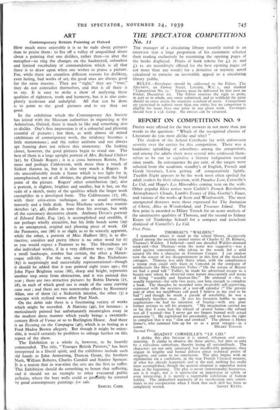REPORT ON COMPETITION NO. 9 PRIZES were offered for the
best answers in not more than 300 words to the question : " Which of the recognised classics of Literature do you most dislike and why? "
The shadow of the School Certificate lay with unforeseen severity over the entries for this competition. There was a handsome sprinkling of schoolboys among the competitors, and among the adults there were several who confessed them- selves to be out to capitalise a literary indignation nursed since youth. In consequence 8o per cent. of the targets were selected from the academic standby's of English, French and Greek literature, Latin getting off comparatively lightly. Twelfth Night appears to be the work most often spoiled for adult readers by their education, with Paradise Lost, Corneille's Le Cid, and Hugo's Les Miserables coming next on the scale. Other popular bites noires were Carlyle's French Revolution, Aristophanes's Clouds, Lamb's Essays of Elia, Goethe's Faust, and various of the works of Scott and Wordsworth. The most unexpected distastes were those expressed for The Imitation of Christ, Alice in Wonderland, and Treasure Island. The first prize is awarded to Hilary Trench for an acute analysis of the unattractive qualities of Thoreau, and the second to Sidney Keyes (of Tonbridge School) for a compact and trenchant dismissal of Corneille's Le Cid.
First Prize. THOREAU'S " WALDEN."
I remember where it stood in the school library, deceptively placed among the exciting animal stories of Charles G. D. Roberts Thoreau's Walden. I believed—until one dreadful Walden-doomed week-end—that Thoreau—even the name was suggestive—was a rebel against convention, who taking to the woods led a wild natural life like a character in Fenimore Cooper. I can analyse now the nature of my disappointment in this first of the thatched cottagers. Thoreau was only thirty when, with the complacency a young man could only learn in Concord in the company of intellectuals like Miss Margaret Fuller (" On the nature of Beauty we had a good talk " Fuller), he made his advertised escape to a beauty-spot where he observed tame nature inaccurately and wrote of living " sturdily and Spartan-like." He endured it—this is usually forgotten—for only two years, just long enough to complete a book. The thoughts he recorded were invariably self-approving, expressed with the neatness of a tear-off calendar (" The greater part of what my neighbours call good I believe in my soul to be bad ") and though he made a parade of sensibility, he was a completely heartless man. (It was his favourite hobby to open negotiations—he had no intention of buying—with any poor farmer anxious to sell his property. " My imagination carried me so far that I even had the refusal of several farms—the refusal was all I wanted—but I never got my fingers burned with actual possession "). He capitalised his personality, and we have the right to complain that it was " slim and crooked." The phrase is Henry James's, who summed him up for us as a great voyager—in a canoe. HILARY TRENCH.
Second Prize.
AGAINST CORNEILLE'S " LE CID."
I dislike this play because it is unreal, inhuman and unin- teresting. It claims to observe the three unities, but does so only by a ridiculous subterfuge, thereby losing all verisimilitude. The characters are not only unnatural, but insufferably pompous; they engage in lengthy and formal debates about technical points of etiquette, and come to no conclusion. The play begins with an explanation via a confidante, in the true French Classical manner, of what has already happened; and at the end, nothing has really been accomplished, though the general situation is somewhat worse than at the beginning. The play is never (intentionally) humorous, nor is it tragic, nor is it spectacular or impressive or subtle or even interesting; it is merely a regrettable exhibition of human futility. The undoubted ingenuity of its versification only contri- butes to my exasperation when I think that such skill has been so




































 Previous page
Previous page